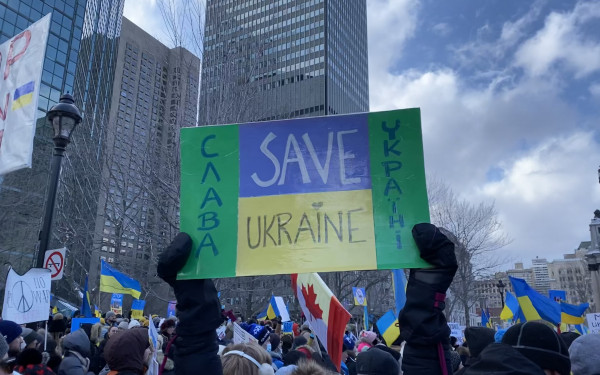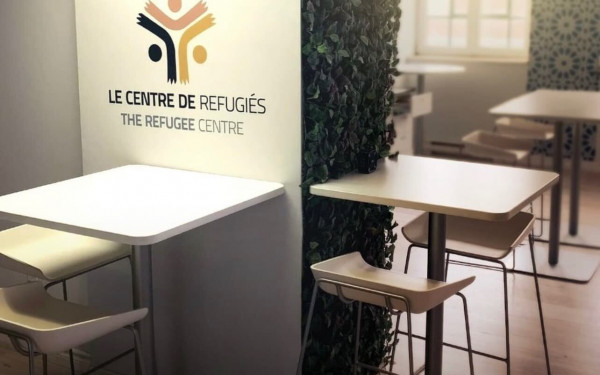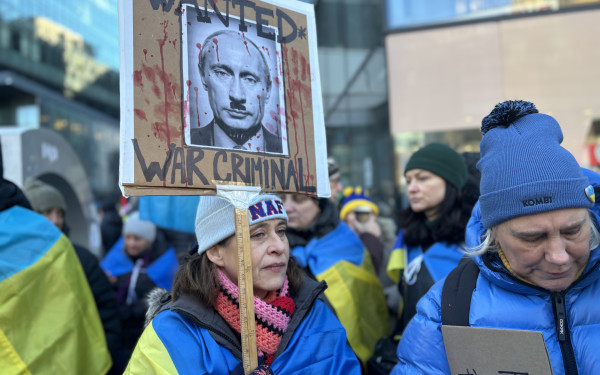Concordia student aiding thousands of refugees crossing the Ukrainian/Hungarian border
Győrffy Christopher (right) and volunteers from the initiative en route to the Ukraine/Hungary border. Photo Courtesy Győrffy Christopher
The initiative organised by Győrffy Christopher transports, helps supply people fleeing the war
“Look at my face, it’s 11 p.m. right now. We’re doing the best we can, but the truth is the war is completely outrageous,” said Győrffy Christopher.
A Concordia student living in Budapest who for the past several weeks has devoted himself to helping Ukrainian refugees.
“If you’d told me three weeks ago that I’d be in this situation, I would have told you that’s crazy talk."
Christopher, who studies in the school of community and public affairs, started a transport and aid initiative to assist Ukrainian refugees crossing the Hungarian border. He began the project shortly after Russian forces entered Ukraine and generated waves of refugees. With minimal governmental support and inaction, Christoper explained that frustration over the situation drove him to action.
When the war broke out, Christopher contacted a friend who happened to own a transport company. Full of uncertainty and in a desperate hurry, they organised a plan and drove towards the border.
The initiative involves Christopher and around 35 colleagues—mostly his coworkers who volunteered—drive refugees to train stations. In addition to providing transportation services, the volunteers have worked alongside organisations like the Red Cross and Baptist Church to hand out essential supplies to incoming refugees at shelters along the border and in Budapest.
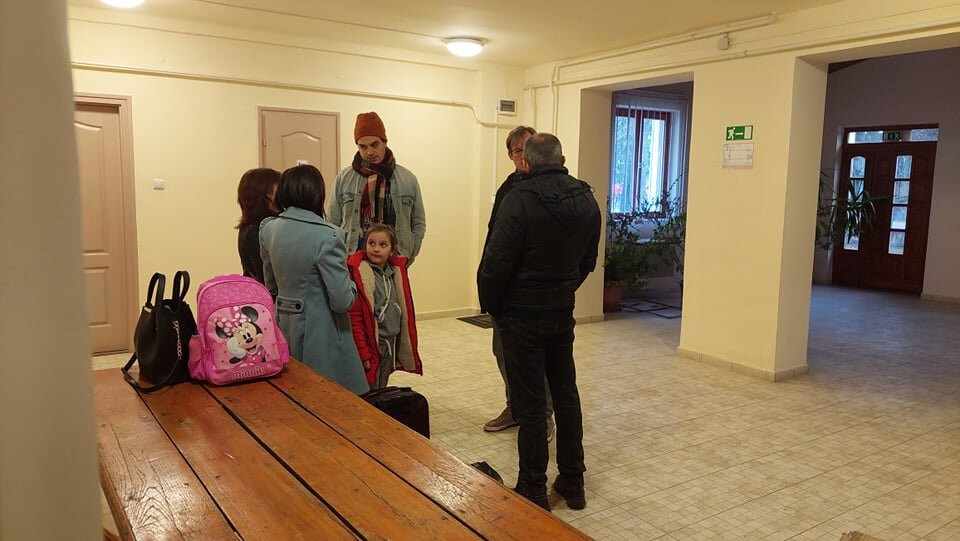
Since the Russian invasion began on Feb. 24, the UN estimates that 3 million people have been displaced by the conflict. Out of these, 250,000 have made the journey to the Hungarian border, a physically and emotionally taxing journey which many have been forced to take on foot.
According to Christopher, most refugees are able to cross at Zahony, a city with direct transit links to Budapest. However, he noted that 20 per cent of refugees cross at Tiszabecs, a small village with few direct links to urban centres that has seen schools and other infrastructure turned into temporary shelters.
“It has no transport hubs, it’s a village. The reason people are sleeping in the school is because [the area only has] two streets with a few houses, a restaurant, and a tobacco store. Imagine that receiving tens of thousands of people,” he added.
He explained that Hungarian authorities transport refugees from isolated Tiszabecs into the nearby town of Fehergyarmat where they can take trains to cities beyond. The main issue, he noted, is translation. Since most incoming Ukrainians are unfamiliar with the Hungarian alphabet and language, they are often unable to read signage providing directions to train stations. This is where volunteers from the initiative stepped in to offer free transportation.
“A police officer told me to translate to her that she had two options. Either she was going to get on the bus or she was going back to Ukraine. To the war.” — Irina
One Russian volunteer, Irina, said more Russian speakers are needed at the border in order to bridge the language gap between refugees and Hungarian officials.
Irina recounted a situation where a mother with two daughters refused to board a bus that would take them to a shelter. She said the mother was waiting for her husband who was already in Hungary and on his way to meet them, but that the language barrier prevented her from communicating this to authorities.
“A police officer told me to translate to her that she had two options. Either she was going to get on the bus or she was going back to Ukraine. To the war.” she said.
Thankfully, Irina said, the woman’s husband arrived. However, they were only allowed to depart together after Irina and Christopher translated their situation to authorities.
Christopher explained that most incoming Ukrainians have already established contact with family and friends in countries like Hungary, Slovakia, and Poland. Their stays in border towns such as Fehergyarmat, are often temporary.
However, Christopher noted that some Ukrainians—mostly mothers—are dropping their children off at the border before returning to support the war effort.
“Some Ukrianians you speak with are willing to die for their country. They’re convinced they’ll win [the war] so they bring their kids and go back with the certainty that they’re going to win, not knowing whether they’re going to live or not,” he stated.
Rakshita Govindaraju is a coworker of Christopher’s and another volunteer with the initiative. She said refugees arrive in states varying between panic and calm. Children, she explained, have shown especially mixed reactions. Some are supplied with chocolates and toys by the volunteers to ease their anxiety, while others remain unaware of the situation’s severity.
Despite this, Govindaraju emphasised resilience as the first word that came to her mind for describing incoming Ukrainians.
“You understand how strong and brave these people are and what they’re going through,” Govindaraju said. “[One woman] kept showing me videos of her daughter from a big dance competition a few weeks ago. Two weeks later her dream was gone.”
“Should I panic with them, be sad with them, or put on a brave face? It’s the sort of moment you both realise you’re human beings,” she said.
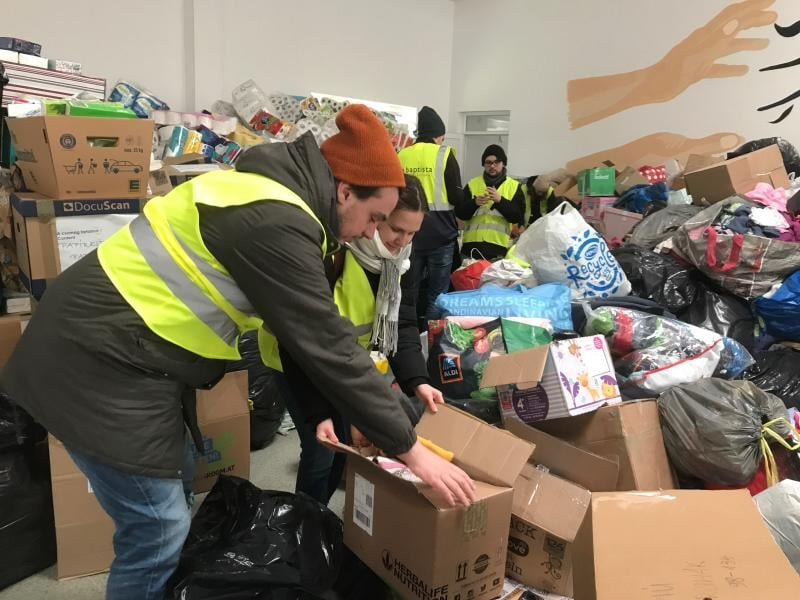
Though organisations like the Red Cross and Baptist Church are well supplied, Christopher explained that the political situation in Hungary prevents further aid from arriving. He said that the Hungarian government provides minimal direct support, and most western NGOs have been banned under Prime Minister Viktor Orbán.
Irina explained that an influx of support has arrived instead from individual Hungarians and others who have poured in from surrounding regions. “People have come from as far away as Norway to give help. Others are offering up their apartments for people to stay,” she said.
Christopher recounted a situation where a group of Indian students fleeing Kharkiv had arrived at the border on foot. He said that the Hungarian border authorities were unprepared to accommodate their Muslim faith and only had salami sandwhiches to offer as meals. “We’re at the border and the first thing they asked us was, ‘Is there any pork in this?’ I had to scramble to find oranges and chips and nuts; whatever I could find to make a box of meals. Otherwise they could not have eaten anything.”
In order to support the initiative, Christopher has begun a JustGiving fundraiser for people to give donations. He said the funds will primarily pay for gas costs and bus rentals to transport volunteers to the border.
Though Christopher’s company now offers a charity leave system allowing its employees to take two paid days off a month to help with the initiative, he stressed that the expenses of this undertaking still put a strain on volunteers.
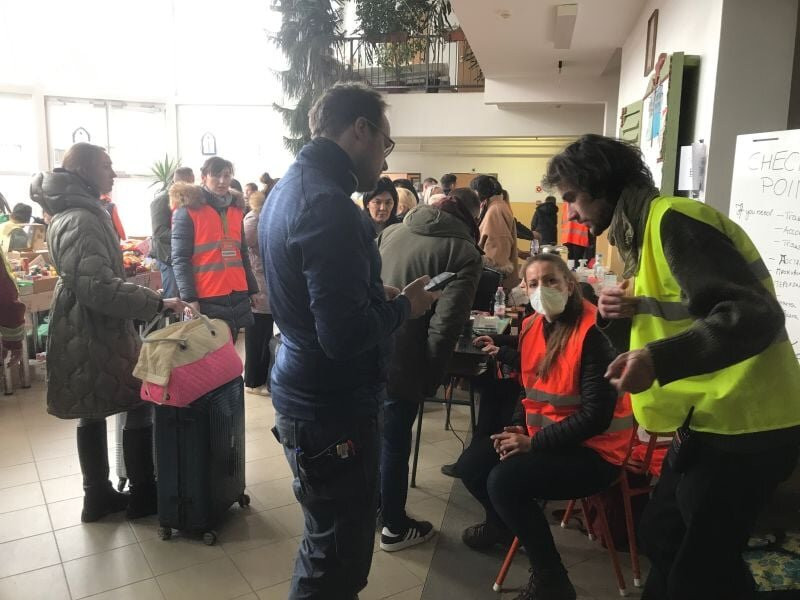
“I knew lots of people in my circles—Canadians and Hungarians—who wanted to help but couldn’t go. They just didn’t have the resources to go,” he said. “Don’t forget this, Hungary is not rich. Driving four hours to go to the border is not an easy feat.”
For Govindaraju, who has experience volunteering in previous human rights issues, the necessity of the situation nonetheless made this an easy choice. “Either I can sit and cry or I can do something about it, even if [I can’t do] a lot. This was an overnight decision and the [initiative] needed people,” she said.
Having reached 40 per cent of their fundraising goal, Christopher has reached out to churches in the hopes of developing partnerships to expand the initiative; especially those he’s had experience working on humanitarian issues with in the past. He said doing so will lend the initiative a more concrete volunteer base, institutional support, and knowledge regarding where best to allocate funds.
In contrast to the commitment of his fellow volunteers, Christopher remains frustrated at the lack of response from Concordia’s administration. He stressed the need for the university to offer concrete support to its Ukrainian and Russian students instead of simply issuing statements; an especially pressing concern given Canada’s large populations of ethnic Russians and Ukrainians.
“They just didn’t have the resources to go. Don’t forget this, Hungary is not rich. Driving four hours to go to the border is not an easy feat.” — Győrffy Christopher
“Concordia should offer counselling, and have people students can talk to. A lot of people are going to lose family members,” he said.
He also called on the Concordia Student Union to adopt an official stance decrying the war; an act which would demonstrate its willingness to undertake concrete actions in support of Ukrainians. He said this could mirror the CSU’s 2012 position, which allowed the union to organise fundraisers and protests in support of Montreal’s Syrian community.
Christopher emphasised the need for continued support going forward. He said this war—which affects the lives of the 40 million people within Ukraine—has the potential to become one of this century’s worst humanitarian disasters. The Russian advance, he said, will only destroy more people’s homes and erase Ukrainian cultural icons.
“Kharkiv is completely destroyed. This is our Aleppo,” he said. “They’ve bombed one of eastern Europe’s gems to pieces, and they’re about to do the same to the legendary city of Odessa.”
For Irina, the long term prospects of this war for Ukraine are worsened by the inability of Russians to resist Vladimir Putin’s government. She explained that a recent law passed by the regime carries an up to 15 year prison sentence for anyone who describes the invasion as a war as opposed to a conflict or special operation.
“They’re convinced they’ll win [the war] so they bring their kids and go back with the certainty that they’re going to win, not knowing whether they’re going to live or not.” — Győrffy Christopher
“I want the Russian people to protest more, but I understand why they’re afraid. They could lose everything they have. I don’t want to lose everything I have here either, I don’t want to lose my life in Russia, so I can’t speak up.”
Despite this grim outlook, Christopher is determined to continue providing aid for as long as it’s required.
“Tomorrow I will wake up at 6 a.m. and go to the border, then I will go back home and the next day I will be working. I have exams to do too. I’m tired. I’m exhausted, and I will perform; we all are. Support refugees,” he added.
Additional Reporting by Mohammad Khan and Mariana Chajon Oliveros.
(One source interviewed for this article, Irina, wished to remain partially anonymous on account of the repercussions she and her family could face from the Russian government).

